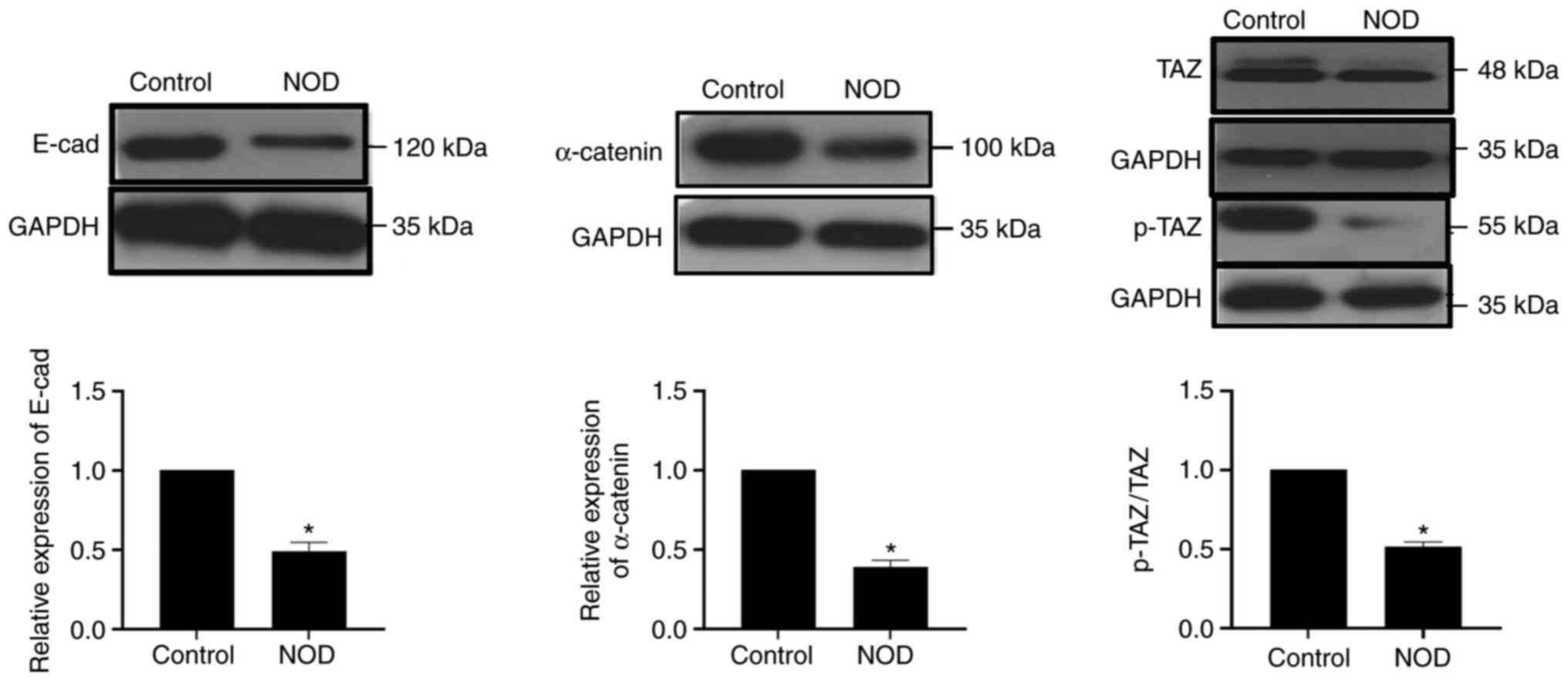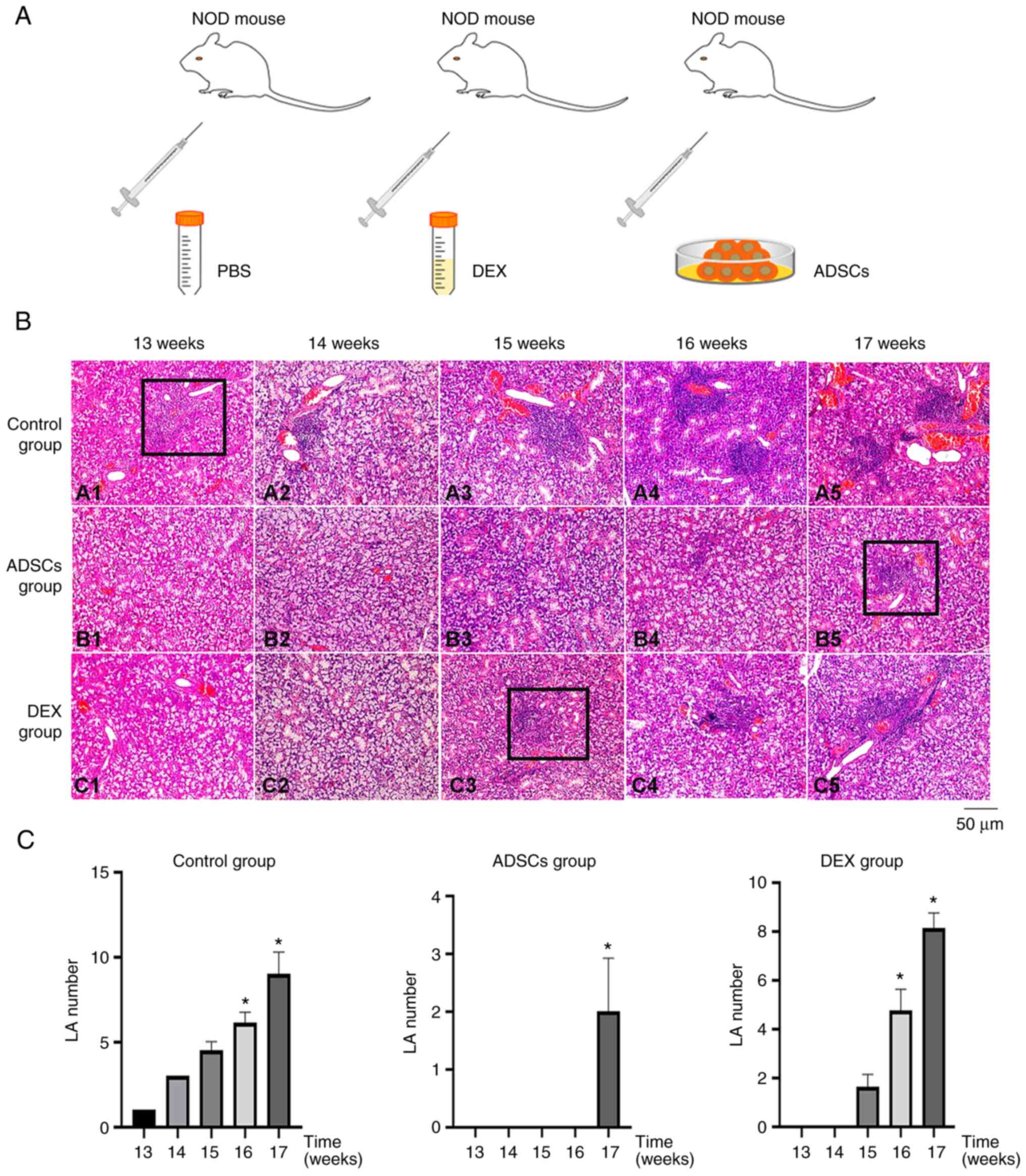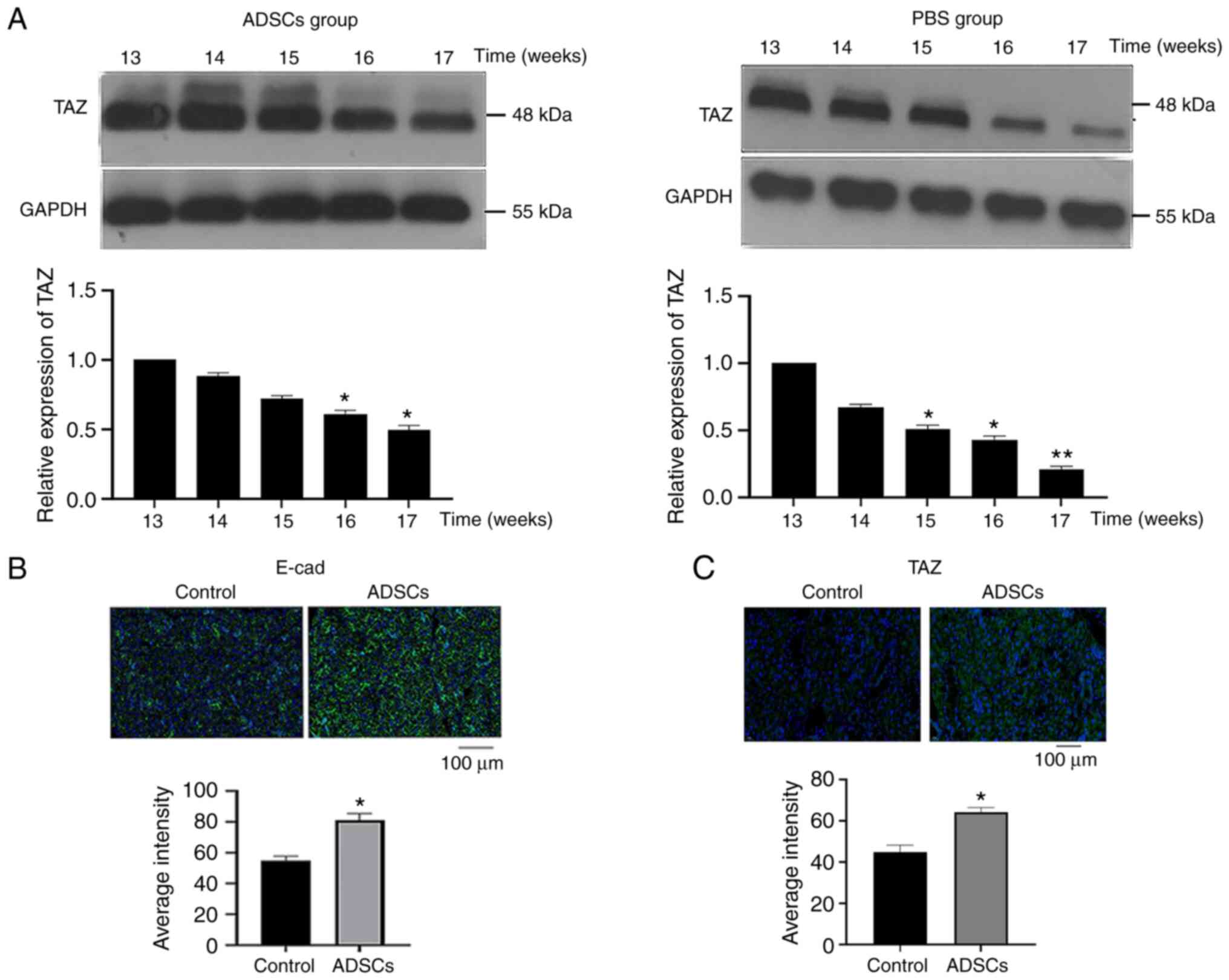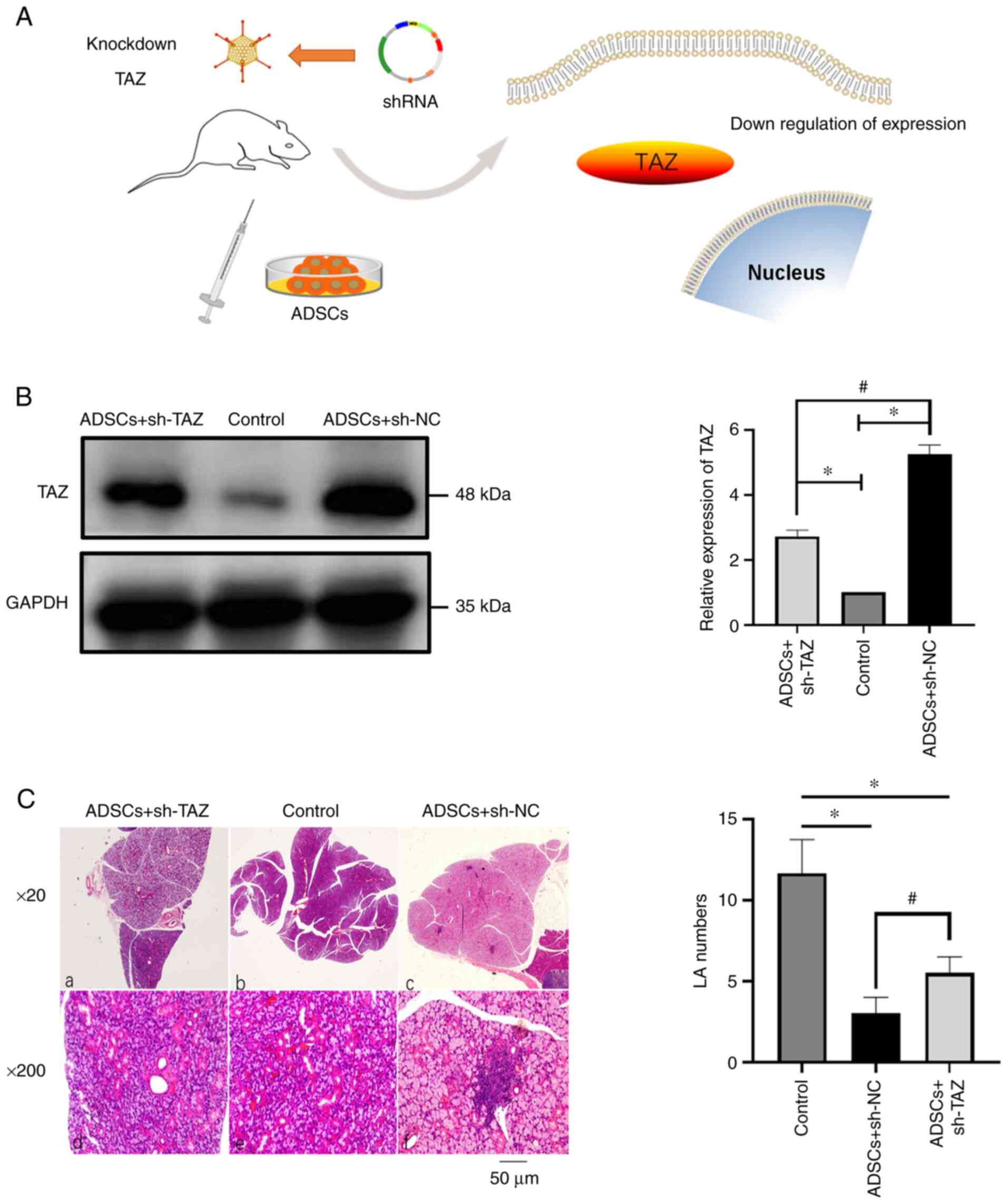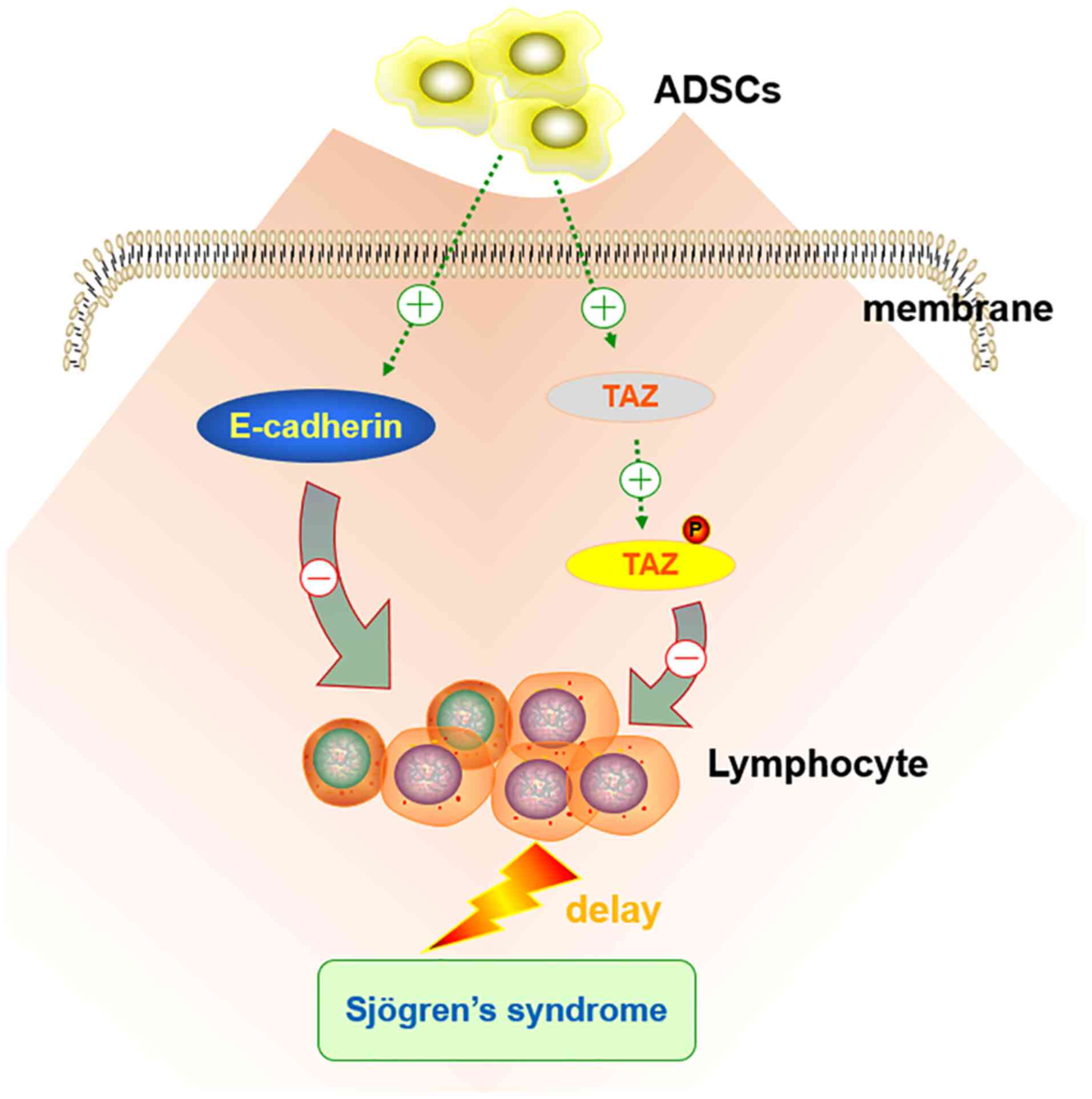|
1
|
Jonsson R, Brokstad KA, Jonsson MV,
Delaleu N and Skarstein K: Current concepts on Sjögren's
syndrome-classification criteria and biomarkers. Eur J Oral Sci.
126 (Suppl 1):S37–S48. 2018.PubMed/NCBI View Article : Google Scholar
|
|
2
|
Stefanski AL, Tomiak C, Pleyer U, Dietrich
T, Burmester GR and Dörner T: The diagnosis and treatment of
Sjögren's syndrome. Dtsch Arztebl Int. 114:354–361. 2017.PubMed/NCBI View Article : Google Scholar
|
|
3
|
Fasano S, Mauro D, Macaluso F, Xiao F,
Zhao Y, Lu L, Guggino G and Ciccia F: Pathogenesis of primary
Sjögren's syndrome beyond B lymphocytes. Clin Exp Rheumatol. 38
(Suppl 126):S315–S323. 2020.PubMed/NCBI
|
|
4
|
Vivino FB: Sjögren's syndrome: Clinical
aspects. Clin Immunol. 182:48–54. 2017.PubMed/NCBI View Article : Google Scholar
|
|
5
|
Melissaropoulos K, Bogdanos D, Dimitroulas
T, Sakkas LI, Kitas GD and Daoussis D: Primary Sjögren's syndrome
and cardiovascular disease. Curr Vasc Pharmacol. 18:447–454.
2020.PubMed/NCBI View Article : Google Scholar
|
|
6
|
Luppi F, Sebastiani M, Silva M,
Sverzellati N, Cavazza A, Salvarani C and Manfredi A: Interstitial
lung disease in Sjögren's syndrome: A clinical review. Clin Exp
Rheumatol. 38 (Suppl 126):S291–S300. 2020.PubMed/NCBI View Article : Google Scholar
|
|
7
|
Bowman SJ: Primary Sjögren's syndrome.
Lupus. 27 (1 Suppl):S32–S35. 2018.
|
|
8
|
Easley JT, Nelson JW, Mellas RE, Sommakia
S, Wu C, Trump B and Baker OJ: Aspirin-triggered resolvin D1 versus
dexamethasone in the treatment of Sjögren's syndrome-like
NOD/ShiLtJ mice-a pilot study. J Rheum Dis Treat.
1(27)2015.PubMed/NCBI View Article : Google Scholar
|
|
9
|
Srivastava A and Makarenkova HP: Innate
immunity and biological therapies for the treatment of Sjögren's
syndrome. Int J Mol Sci. 21(9172)2020.PubMed/NCBI View Article : Google Scholar
|
|
10
|
Gandolfo S and De Vita S: Double anti-B
cell and anti-BAFF targeting for the treatment of primary Sjögren's
syndrome. Clin Exp Rheumatol. 37 (Suppl 118):S199–S208.
2019.PubMed/NCBI
|
|
11
|
De Vita S, Quartuccio L, Salvin S, Picco
L, Scott CA, Rupolo M and Fabris M: Sequential therapy with
belimumab followed by rituximab in Sjögren's syndrome associated
with B-cell lymphoproliferation and overexpression of BAFF:
Evidence for long-term efficacy. Clin Exp Rheumatol. 32:490–494.
2014.PubMed/NCBI
|
|
12
|
Schmid R, Wolf K, Robering JW, Strauß S,
Strissel PL, Strick R, Rübner M, Fasching PA, Horch RE, Kremer AE,
et al: ADSCs and adipocytes are the main producers in the
autotaxin-lysophosphatidic acid axis of breast cancer and healthy
mammary tissue in vitro. BMC Cancer. 18(1273)2018.PubMed/NCBI View Article : Google Scholar
|
|
13
|
Zhai Y, Wu W, Xi X and Yu R:
Adipose-derived stem cells promote proliferation and invasion in
cervical cancer by targeting the HGF/c-MET pathway. Cancer Manag
Res. 12:11823–11832. 2020.PubMed/NCBI View Article : Google Scholar
|
|
14
|
Zhang W, Feng YL, Pang CY, Lu FA and Wang
YF: Transplantation of adipose tissue-derived stem cells
ameliorates autoimmune pathogenesis in MRL/lpr mice: Modulation of
the balance between Th17 and Treg. Z Rheumatol. 78:82–88.
2019.PubMed/NCBI View Article : Google Scholar
|
|
15
|
National Research Council (US) Committee
for the Update of the Guide for the Care and Use of Laboratory
Animals. Guide for the care and use of laboratory animals, 8th
edition. Washington (DC): National Academies Press (US), 2011.
|
|
16
|
Boki KA, Ioannidis JP, Segas JV,
Maragkoudakis PV, Petrou D, Adamopoulos GK and Moutsopoulos HM: How
significant is sensorineural hearing loss in primary Sjögren's
syndrome? An individually matched case-control study. J Rheumatol.
28:798–801. 2001.PubMed/NCBI
|
|
17
|
Dou R, Zhang X, Xu X, Wang P and Yan B:
Mesenchymal stem cell exosomal tsRNA-21109 alleviate systemic lupus
erythematosus by inhibiting macrophage M1 polarization. Mol
Immunol. 139:106–114. 2021.PubMed/NCBI View Article : Google Scholar
|
|
18
|
Bottini A, Wu DJ, Ai R, Le Roux M, Bartok
B, Bombardieri M, Doody KM, Zhang V, Sacchetti C, Zoccheddu M, et
al: PTPN14 phosphatase and YAP promote TGFβ signalling in
rheumatoid synoviocytes. Ann Rheum Dis. 78:600–609. 2019.PubMed/NCBI View Article : Google Scholar
|
|
19
|
Enger TB, Samad-Zadeh A, Bouchie MP,
Skarstein K, Galtung HK, Mera T, Walker J, Menko AS, Varelas X,
Faustman DL, et al: The Hippo signaling pathway is required for
salivary gland development and its dysregulation is associated with
Sjogren's syndrome. Lab Invest. 93:1203–1218. 2013.PubMed/NCBI View Article : Google Scholar
|
|
20
|
Inoue H, Kishimoto A, Ushikoshi-Nakayama
R, Hasaka A, Takahashi A, Ryo K, Muramatsu T and Ide F: Resveratrol
improves salivary dysfunction in a non-obese diabetic (NOD) mouse
model of Sjögren's syndrome. J Clin Biochem Nutr. 59:107–122.
2016.PubMed/NCBI View Article : Google Scholar
|
|
21
|
Wang X, Liu C, Li S, Xu Y, Chen P, Liu Y,
Ding Q, Wahapu W, Hong B and Yang M: Effects of continuous passage
on immunomodulatory properties of human adipose-derived stem cells.
Cell Tissue Bank. 16:143–150. 2015.PubMed/NCBI View Article : Google Scholar
|
|
22
|
Jonsson R, Bolstad AI, Brokstad KA and
Brun JG: Sjögren's syndrome-a plethora of clinical and
immunological phenotypes with a complex genetic background. Ann N Y
Acad Sci. 1108:433–447. 2007.PubMed/NCBI View Article : Google Scholar
|
|
23
|
Szymaniak AD, Mi R, McCarthy SE, Gower AC,
Reynolds TL, Mingueneau M, Kukuruzinska M and Varelas X: The Hippo
pathway effector YAP is an essential regulator of ductal progenitor
patterning in the mouse submandibular gland. Elife.
6(e23499)2017.PubMed/NCBI View Article : Google Scholar
|
|
24
|
Miyachi Y, Nishio M, Otani J, Matsumoto S,
Kikuchi A, Mak TW, Maehama T and Suzuki A: TAZ inhibits acinar cell
differentiation but promotes immature ductal cell proliferation in
adult mouse salivary glands. Genes Cells. 26:714–726.
2021.PubMed/NCBI View Article : Google Scholar
|
|
25
|
Varelas X and Wrana JL: Coordinating
developmental signaling: Novel roles for the Hippo pathway. Trends
Cell Biol. 22:88–96. 2012.PubMed/NCBI View Article : Google Scholar
|
|
26
|
Sisto M, Ribatti D and Lisi S: Cadherin
signaling in cancer and autoimmune diseases. Int J Mol Sci.
22(13358)2021.PubMed/NCBI View Article : Google Scholar
|
|
27
|
Wang C, Xu X, Jin H and Liu G: Nicotine
may promote tongue squamous cell carcinoma progression by
activating the Wnt/β-catenin and Wnt/PCP signaling pathways. Oncol
Lett. 13:3479–3486. 2017.PubMed/NCBI View Article : Google Scholar
|
|
28
|
Naderi N, Combellack EJ, Griffin M,
Sedaghati T, Javed M, Findlay MW, Wallace CG, Mosahebi A, Butler
PE, Seifalian AM and Whitaker IS: The regenerative role of
adipose-derived stem cells (ADSC) in plastic and reconstructive
surgery. Int Wound J. 14:112–124. 2017.PubMed/NCBI View Article : Google Scholar
|
|
29
|
Li Z, Wang S, Fang S, Li X, Li T and Liu
G: Adipose-derived stem cells promote the proliferation, migration,
and invasion of oral squamous cell carcinoma cells by activating
the Wnt/planar cell polarity signaling pathway. Transl Cancer Res.
11:306–315. 2022.PubMed/NCBI View Article : Google Scholar
|
|
30
|
Bora P and Majumdar AS: Adipose
tissue-derived stromal vascular fraction in regenerative medicine:
A brief review on biology and translation. Stem Cell Res Ther.
8(145)2017.PubMed/NCBI View Article : Google Scholar
|
|
31
|
Lv W, Graves DT, He L, Shi Y, Deng X, Zhao
Y, Dong X, Ren Y, Liu X, Xiao E and Zhang Y: Depletion of the
diabetic gut microbiota resistance enhances stem cells therapy in
type 1 diabetes mellitus. Theranostics. 10:6500–6516.
2020.PubMed/NCBI View Article : Google Scholar
|
|
32
|
Chang Q, Li C, Lu Y, Geng R, Wei JN and Hu
JZ: Adipose-derived mesenchymal stromal cells suppress
osteoclastogenesis and bone erosion in collagen-induced arthritis.
Scand J Immunol. 92(e12877)2020.PubMed/NCBI View Article : Google Scholar
|
|
33
|
Li X, Lu X, Sun D, Wang X, Yang L, Zhao S,
Nian H and Wei R: Adipose-derived mesenchymal stem cells reduce
lymphocytic infiltration in a rabbit model of induced autoimmune
dacryoadenitis. Invest Ophthalmol Vis Sci. 57:5161–5170.
2016.PubMed/NCBI View Article : Google Scholar
|
|
34
|
Kim NG, Koh E, Chen X and Gumbiner BM:
E-cadherin mediates contact inhibition of proliferation through
Hippo signaling-pathway components. Proc Natl Acad Sci USA.
108:11930–11935. 2011.PubMed/NCBI View Article : Google Scholar
|
|
35
|
Zhao Y, Gao C, Liu H, Liu H, Feng Y, Li Z,
Liu H, Wang J, Yang B and Lin Q: Infliximab-based self-healing
hydrogel composite scaffold enhances stem cell survival,
engraftment, and function in rheumatoid arthritis treatment. Acta
Biomater. 121:653–664. 2021.PubMed/NCBI View Article : Google Scholar
|















